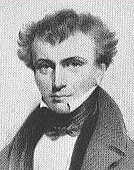 WILLIAM WHEWELL
WILLIAM WHEWELL
English
You are the first philosopher and historian of science. It was you who coined the term 'scientist' in 1833 (before that, in 1832, you coined "uniformitarian" and "catastrophist" and you are frequently asked for advice on neologisms). As a respected philosopher who is interested in geology (and other sciences), and as a colleague of Sedgwick at Cambridge, you were asked to be President of the Geological Society for 1837 and 1838.
You have written A History of the Inductive Sciences and you have some strong and influential views about the nature of proper scientific methods. You argue that basic facts should be clearly established first and upon them "Theories, constructed inductively, connect and explain facts . . . an inductive truth is proved . . . by its agreeing with the facts described." However, one must be careful not to accept a theory prematurely – it must be supported by a wide range of facts gathered over time, preferably of new and different phenomena (such as drift, convulsed strata, and theories of mountain building): in this way, a theory becomes more coherent. One must not accept a theory simply because no other explanation is available.
Regarding geology, which he regarded primarily as a historical science: "Geology examines the existing appearance of the materials which form the earth, infers from them previous conditions, and speculates concerning the forces by which one condition has been made to succeed another. The term 'Theory,' when rigorously employed in such sciences as those which we here consider, bears nearly the sense which I have adopted: it implies a consistent and systematic view of the actual facts, combined with a true apprehension of their connexion and causes." In this regard you believe that Lyell's uniformitariansim represents an a priori assumption: for you, the evidence of the strata came first and support a more catastrophist conclusion.
Familiarize yourself with a sampling of Episodes.
Read and summarize:
Be familiar with the concepts of prediction, consilience, and coherence and their relevance to evaluating scientific claims. [Consult with instructor.]
Be aware:
- You have no field experience. For example, you have not studied glaciers in the Alps (you have no field experience of ice-bergs either – but no one else has studied these either as agents of erosion or deposition). You are sympathetic to catastrophism, which you see are supported by evidence in the strata.
Supplemental Bibliography
Whewell, W. 1832 Review of volume 2 of Lyell's Principles of geology The Quarterly Review v.47 (March & July)
http://books.google.com/books?id=vnVZAAAAIAAJ&pg=PP7#v
Whewell, W. Presidential addresses 1838 and 1839
http://books.google.com/books?id=dvc4AAAAMAAJ&pg=PA624#v
http://books.google.com/books?id=giPPAAAAMAAJ&pg=PA61#v
Whewell, W. 1840 The philosophy of the inductive sciences founded upon their history, vols 1 & 2
http://books.google.com/books?id=um85AAAAcAAJ&pg=PR1#v
http://books.google.com/books?id=yPcDAAAAQAAJ&pg=PR3#v
Whewell, W. The progress of geology. The Edinburgh Philosophical Journal v.11 p.242-267
http://www.archive.org/details/edinburghnewphil11edin
|

